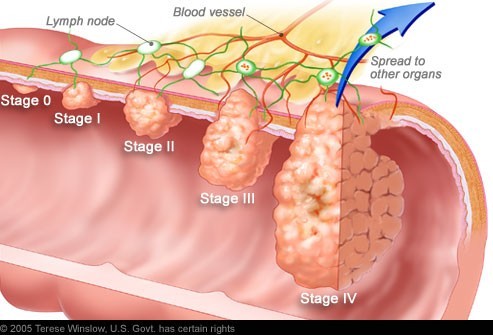
Diagnosed with Cancer? Your two greatest challenges are understanding cancer and understanding possible side effects from chemo and radiation. Knowledge is Power!
Learn about conventional, complementary, and integrative therapies.
Dealing with treatment side effects? Learn about evidence-based therapies to alleviate your symptoms.
Click the orange button to the right to learn more.
- You are here:
- Home »
- Blog »
- non-conventional therapies »
- Kill Colon Cancer Stem Cells, Prevent Colon Cancer Relapse?
Kill Colon Cancer Stem Cells, Prevent Colon Cancer Relapse?

Colon Cancer (CC) Relapse is Driven by Cancer Stem Cells (CSC)- Grape Seed Extract and Resveratrol Kill CC Stem Cells
As is often the case, the devil is in the details. The study linked and excerpted below is not important because research has shown that a non-toxic, non-conventional therapy kills cancer. That happens all the time. The reason why the study below is so important is because grape seed extract and resveratrol taken together kill colon cancer (CC) stem cells.
If you were diagnosed with CC, underwent surgery to remove the cancer, your surgeon would tell you something like “we got it all!” Hopefully. For the rest of your life your challenge then is to avoid a relapse of your colon cancer. Taking grape seed extract. resveratrol and curcumin supplements daily could very well help you avoid relapse of your cancer.
David Emerson
- Cancer Survivor
- Cancer Coach
- Director PeopleBeatingCancer
Recommended Reading:
- Probiotics as Therapy for Inflammatory Bowel Disease assoc. Colorectal Cancer
- Grape Seed Extract-Reduce Mucositis & Enhance Colon Cancer Chemo
- Curcumin Integrative, Non-Toxic Colorectal Cancer Therapy
- Non-Toxic Therapy for Colon Polyps
Grape-based compounds kill colon cancer stem cells in mice
“Compounds from grapes may kill colon cancer stem cells both in a petri dish and in mice, according to a team of researchers.
The compounds — resveratrol — which are found in grape skins and seeds, could also eventually lead to treatments to help prevent colon cancer…
“The combination of resveratrol and grape seed extract is very effective at killing colon cancer cells…”
“We are particularly interested in targeting stem cells because, according to cancer stem-cell theory, cancerous tumors are driven by cancer stem cells,” said Vanamala. “Cancer stem cells are capable of self-renewal, cellular differentiation and maintain their stem cell-like characteristics even after invasion and metastasis.”
When taken separately in low doses, resveratrol and grape seed extract are not as effective against cancer stem-cell suppression as when they are combined together, according to the researchers.
The combined effect of grape seed extract and resveratrol may offer clues as to why cultures with a plant-based diet tend to have lower colon cancer rates, said Vanamala. These diets may naturally be providing a shotgun approach to cancer prevention by using a wide variety of beneficial compounds to target multiple pathways that cancer stem cells use to survive.
“This also connects well with a plant-based diet that is structured so that the person is getting a little bit of different types of plants, of different parts of the plant and different colors of the plant,” said Vanamala. “This seems to be beneficial for not only promoting bacterial diversity, but also preventing chronic diseases and eliminating the colon cancer stem cells.”
If successful in human trials, the compounds could be taken in low doses using currently available supplements for grape seed extract and resveratrol, which are also found in wine…
For the animal study, the researchers separated 52 mice with colon cancer tumors into three groups, including a control group and groups that were fed either the grape compounds or sulindac, an anti-inflammatory drug, which was chosen because a previous study showed it significantly reduced the number of tumors in humans.
The incidence of tumors was suppressed in the mice consuming the grape compounds alone by 50 percent, similar to the rate in the group consuming the diet with sulindac.”
Curcumin and Colorectal Cancer: From Basic to Clinical Evidences
“Curcumin diffuses through cell membranes into the endoplasmic reticulum, mitochondria, and nucleus, where it exerts actions, as an antioxidant property. Therefore, its use has been advocated for chemopreventive, antimetastatic, and anti-angiogenic purposes.
We conducted a literature review to summarize studies investigating the relationship between curcumin and colorectal cancer (CRC). In vitro studies, performed on human colon cancer cell lines, showed that curcumin inhibited cellular growth through cycle arrest at the G2/M and G1 phases, as well as stimulated apoptosis by interacting with multiple molecular targets.
In vivo studies have been performed in inflammatory and genetic CRC animal models with a chemopreventive effect.
To improve curcumin bioavailability, it has been associated with small particles that increase its absorption when orally administered with excellent results on both inflammation and carcinogenesis. Curcumin has been used, moreover, as a component of dietetic formulations for CRC chemoprevention.
These combinations showed in vitro and in vivo anticarcinogenetic properties in inflammation-related and genetic CRC. A synergic effect was suggested using an individual constituent dosage, which was lower than that experimentally used “in vivo” for single components. In conclusion, curcumin falls within the category of plant origin substances able to prevent CRC in animals. This property offers promising expectations in humans…”


